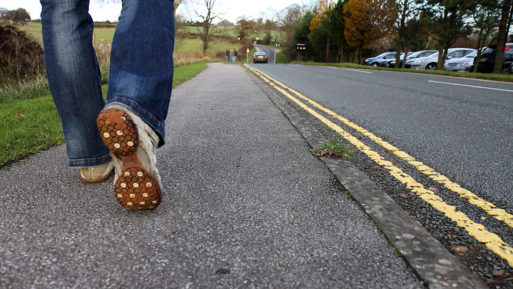
Are you a speed walker, or do you prefer to move at a more leisurely pace? Your answer could predict whether you’re at risk for developing heart disease later in life. A new study has found a link between average walking speed and heart disease. In general, those who walk at a brisk pace are less likely to develop with cardiovascular issues compared to those who walk more slowly.
Researchers at the University of Leicester studied nearly 500,000 middle-aged people living in the United Kingdom between 2006 and 2010. At the start of their study, the vast majority of people (about 420,000) didn’t have heart disease. Just a few years later, by 2010, the researchers found that 1,654 people in the study had died from heart disease. To determine why these people developed heart disease, researchers looked at a wide range of environmental factors, such as walking speed, diet, exercise habits, alcohol consumption and even hand-grip strength.
When researchers analyzed these factors, they found a close relationship between slow walking speed and heart disease among the people they studied. Those who said that they walk slowly were about twice as likely to develop and die from heart disease compared to those who reported walking more quickly.
However, experts still aren’t certain whether slow walking speed actually causes heart disease. For example, people who reported walking at slower speeds were also more likely to report that they had low exercise levels in general. And lack of exercise is already a proven risk factor for heart disease and other cardiovascular issues.

But slow walking speed and heart disease wasn’t the only link that researchers found in the study. They also discovered that Body Mass Index (BMI) may play a role. According to the study, slow walkers who have a low BMI are actually far more likely to develop heart disease than slow walkers with a high BMI. Researchers suspect that this is the result of undernourishment or the normal loss of muscle mass that comes with age. People who are malnourished tend to have a higher risk of heart disease in general, as do people who have little muscle mass. In this case, slow walking may just be a symptom of weakened muscles or undernourishment.
Link Doesn’t Prove Causation
Heart disease risk can be difficult to study in part because so many environmental and genetic factors can play a role. So, while it appears that walking speed and heart disease correlate in some way, experts still aren’t sure whether slow walking causes heart disease, or if it’s the other way around. For instance, another study found that people who have high blood pressure are less likely to walk quickly because fast walking may be too taxing for them.
Regardless of whether a slow walking pace causes heart disease, or if heart disease slows a person’s walking pace, experts generally agree that speeding up your walk or doing other types of exercise could improve your overall health. Other studies have found that people who walk at a brisk pace (or do other forms of moderate exercise like bicycling) at least five times per week for 30 minutes each day were much less likely to develop heart disease than those who rarely exercise. In other words, even if you’re a naturally slow walker, you can still decrease your risk for heart disease by scheduling some other types of moderate exercise into your routine.

 Scientists Find a Link Between Walking Speed and Heart Disease
Scientists Find a Link Between Walking Speed and Heart Disease


 “Briefly Perfectly Human” by Alua Arthur
“Briefly Perfectly Human” by Alua Arthur
 Neil deGrasse Tyson Prompts Ruminations on Life & Death in New Year
Neil deGrasse Tyson Prompts Ruminations on Life & Death in New Year
 “I Will Remember You” by Sarah McLachlan
“I Will Remember You” by Sarah McLachlan














